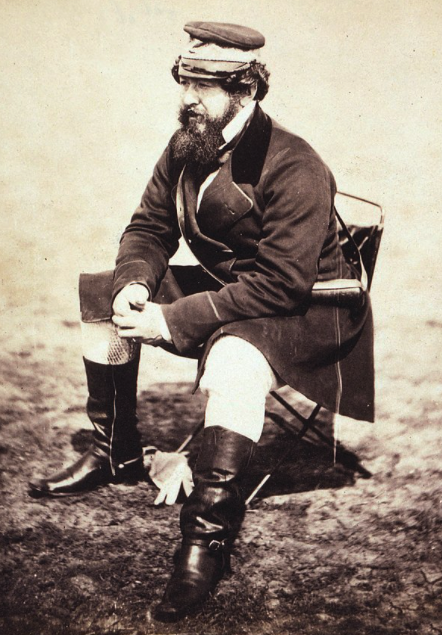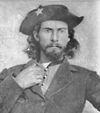New York at the Beginning of the Civil War, William Russell, 1861

William Russell was an Irish reporter for The Times. He is considered to be one of the first war correspondents having reported, for instance, on the Crimean War. He happened to be in the United States when the Civil War was beginning and wrote several letters with interesting observations.
In this selection, Russell addressed some of the prevailing opinions current in New York City in 1861 concerning the Morrill tariff, American Democracy, the Constitution, and more.
For those who like the Civil War, there will be food for thought in this post.
August Glen-James, editor
They assert there is no recuperative power in the Constitution. The sick physician cannot heal himself, for he has caused his own illness, and a Convention, the great nostrum of the fathers of the Republic, is only an appeal from Philip drunk to Philip mad.
We are accustomed to think the Americans a very excitable people; their personal conflicts, their rapid transitions of feelings, the accounts of their public demonstrations, their energetic expressions, their love of popular assemblies, and the cultivation of the arts, which excite their passions, are favorable to that notion. But New York seems full of divine calm and human phlegm. A panic in Wall Street would, doubtless, create greater external disturbance than seemed to be to exist in its streets and pleasant mansions. No doubt there is, and must be, very great agitation of feeling, and much apprehension; but to the stranger they are not very patent or visible. An elegant refinement, which almost assumes the airs of pococuranteism, reigns in society, only broken by the vehement voices of female patriotism, or the denunciations addressed against the provisions of a tariff, which New York seems unanimous in regarding with hostility and dismay. If Rome be burning, there are hundreds of noble Romans fiddling away in the Fifth Avenue, and in its dependencies, quite satisfied that they cannot join any of the fire companies, and that they are not responsible for the deeds of the “Nero” or “anti-Nero” who applied the torch. They marry, and are given in marriage; they attend their favorite theaters, dramatic or devotional, as the case may be, in the very best coats or bonnets; they eat the largest oysters, drink the best wines, and enjoy the many goods the gods provide them, unmoved by the daily announcement that Fort Sumter is evacuated, that the South is arming, and the Morrill tariff is ruining the trade of the country. And, as they say, “What can we do?” “We are,” they insinuate, “powerless to avert the march of events. We think everybody is wrong. Things were going on very pleasantly when these Abolitionists disturbed the course of trade, and commerce, and speculation with their furious fantasies; and now the South, availing themselves of the opportunity which the blindness of their enemies has afforded them to do what they have wished in their hearts for many a year, start in business for themselves, and will not be readily brought back by the lure of any concession till they find they are unable to get money to pay their way, and resort to measures which may be ruinous to capital, or lead to reconstruction of the Confederation on both sides.”
If pursuing the researches which such remarks suggest, an investigation is made in the same stratum of thought by careful exploration, it will not be long before the miner comes upon matters which he never could have expected to find in that particular gallery. What are the most cherished institutions of the Great Republic? If the intelligent foreigner were asked what were the fundamental principles which, guaranteed by, and guaranteeing, their Constitution, the people of the United States admired the most, he would probably reply, “Universal suffrage (with its incidental exercise of vote by ballot), free citizenship, a free press.” Probably he would answer correctly in the main, for he would know more of the matter than I do; but if he visited New work for a few days, what would be his amazement to see his best friends shake their heads at the very mention of these grand Shibboleths! How would his faith be disturbed when he learnt from some merchant prince that universal suffrage, in its practical workings in that city, had handed over the municipal government to the most ignorant, if not the most unprincipled men; that it flooded and submerged the landmarks of respectability and station by a tide of barbarous immigrant foreigners; that the press had substituted licentiousness for liberty; and that the evils done in New York by these agencies afflicted the whole State!
Ingenious theorists might attempt to convince him that the effect of these mischievous elements had been felt at the very center of the social system, and had led to the separation which, be it temporary or permanent, all Northern Americans deplore. Few, however, would admit that the failure of Republican institution is by any means involved in the disasters which have fallen on the Commonwealth, even when they freely confess that they desire to modify the Constitution, while they lament the impossibility of doing so in consequence of the very condition of things it has created. It is my firm conviction, forced on my mind by the words of many men of note with whom I have spoken, that they would gladly, if they could, place some limits to their own liberties as far as their fellow-men are concerned, and that they begin to doubt whether a Constitution founded on abstract principles of the equality of mankind can be worked out in huge cities—veritable cloacæ gentium—however successful it was in the earlier days of the Republic, and as it is in the sparsely inhabited rural districts where every inhabitant represents property. These men may be a small minority, but they certainly represent great wealth, much ability, and high intelligence in the State of which I speak. They assert there is no recuperative power in the Constitution. The sick physician cannot heal himself, for he has caused his own illness, and a Convention, the great nostrum of the fathers of the Republic, is only an appeal from Philip drunk to Philip mad. “Volumus leges Americæ mutari,” is their despairing aspiration, and they justify the wish by contrasts between the state of things which existed when the Constitution was prepared for the thirteen Confederated States and that which prevails at the present time, when thirty-four States, some two or three of which are equal to the original Republic, and many of which declare they are absolute sovereignties; which have absorbed all the nomads of the Old World, which a fair proportion of Genghis Khans, Attilas, and Timours in embryo, present a spectacle which the most sagacious of the framers of the original compact never could have imagined.
Russell, William H. The Civil War in America (1861. Boston. Gardner A. Fuller, Washington Street. PP. 4-6.
